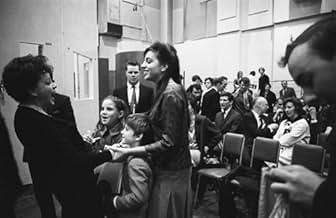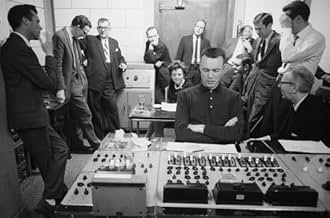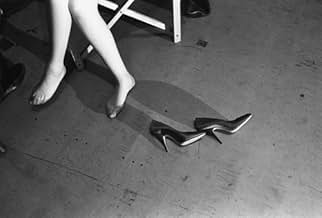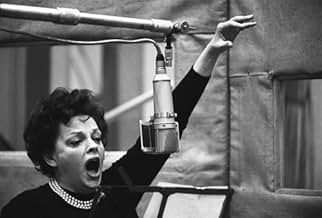Jenny Bowman is a successful singer who visits David Donne to see her son Matt again, spending a few glorious days with him while his father is away in Rome in an attempt to attain the famil... Read allJenny Bowman is a successful singer who visits David Donne to see her son Matt again, spending a few glorious days with him while his father is away in Rome in an attempt to attain the family that she never had.Jenny Bowman is a successful singer who visits David Donne to see her son Matt again, spending a few glorious days with him while his father is away in Rome in an attempt to attain the family that she never had.
- Director
- Writers
- Stars
- Backstage Parent
- (uncredited)
- …
- HMS Pinafore Audience
- (uncredited)
- …
- Theatre Audience
- (uncredited)
- Director
- Writers
- All cast & crew
- Production, box office & more at IMDbPro
Featured reviews
Medical experts warned Judy would never sing again in the early fifties before she made the astonishing "A Star is Born." Then she went on to her historic national concert tours, and fifteen years after "Star" she made "I Could Go on Singing."
Defying all predictions about her career, Garland triumphed. True, it wasn't easy, for her or her fellow actors and crew. Somehow, though, she just kept bouncing back, overcoming the most formidable obstacles.
Here she's supported by an excellent cast headed by Dirk Bogard in a very strong performance. Ronald Neame's direction is on-target, though the script is a bit uneven. Yet the film is looking better and better, and viewers are growing in their appreciation of this legacy of one of the 20th century's most talented and beloved artists.
Here, Garland plays Jenny Bowman, a famous performer who comes to London with a manager (Jack Klugman) and an assistant (Aline McMahon) to do concerts and goes to see an ex-beau, Dr. David Donne (Dirk Bogarde) with a faux medical problem. He knows she has an ulterior motive.
The two of them had broken up, but later, Jenny gave birth to their son. The newlywed David and his wife adopted the child because Jenny couldn't really handle carrying for a new baby and having a career. Matt never knew and believed that both David and his wife were his adopted parents.
Jenny claims that now that David's wife is dead, she just wants to see her son (Gregory Phillips). Once she sees him, she wants to spend time with him - it spirals out of control.
Despite its soapy plot, "I Could Go on Singing" manages to be very effective for two reasons: Judy Garland and Dirk Bogarde, both of whom lift this film up from the maudlin.
Bogarde is an uncredited writer on this film, contributing a lot of Garland's dialogue, as the script needed work before she could take the role; he often participated in screen writing on his films.
Garland plays her role as a brilliant talent who is a needy woman, but one who also is used to getting her way and knows what she wants. Despite an outer fragility, she knows how to stand up for herself.
As an entertainer, she is second to none - magical, warm, exciting, passionate, and fun. Garland sings the title song plus "By Myself," "It Never Was You", and "Hello, Blue Bird," all beautifully performed. Garland looks petite and wonderful as well.
During the scene in the hospital, in which David comes to see Jenny after she sprains her actor, the director, Ronald Neame, realized as the camera was rolling that the scene had passed out of the movie and into real life. Garland was no longer Jenny but Garland.
There was an incredibly intense atmosphere in the room, so instead of yelling cut, doing another take, and repositioning the camera, he let the scene go on. Normally a scene like that would take all day to film.
Bogarde realized that Neame wasn't going to stop and even altered his dialogue to respond to her. The result is an incredibly moving, very personal scene.
Bogarde gives a low-key performance and is perfect opposite Garland, very British, attempting to keep his emotions even -- a very generous actor who was also helpful to Neame in keeping Garland going.
There were a great many difficulties on the set, including an incident where a plate of food went flying through the air as Judy yelled at director Henry Hathaway. In the end, they all made it through, and the result is successful.
We have lots of examples on the screen and in recording of Judy Garland's tremendous talent and brilliance. "I Could Go On Singing" is a look at a character very close to Garland and gives a good sense of the real woman. Art imitates life, or did life imitate art - with Garland, one never knows.
Did you know
- TriviaOfficially regarded as her final film before her death in 1969, Judy Garland filmed it immediately after making A Child Is Waiting (1963) though I Could Go on Singing (1963) was released first. At the time of filming, Garland was going through an ugly child custody battle of her own with her soon-to-be-divorced husband, Sidney Luft. The opportunity to make a film in England with Sir Dirk Bogarde, an actor and friend she had long admired, provided the perfect escape from her problems at home but unfortunately Garland carried her troubles with her across the Atlantic.
- GoofsThe elevator scene in the first third of the movie shows a continuous carpet between the elevator floor and the hallway floor, without a break for the moving elevator, indicating that it is not an actual elevator.
At the same time, you can tell that the elevator operator is squatting toward the front of the elevator, waiting for the partition to rise to make it look like the elevator is coming up from another floor, and as the elevator leaves, you can tell the operator is not moving down with it.
- Quotes
Jenny Bowman: You think you can make me sing? Do you think you can - do you think George can make me sing? or Ida? You can get me there, sure, but can you make me sing? I sing for myself. I sing when I want to, whenever I want to, just for me. I sing for my own pleasure. Whenever I want - do you under stand that?
- ConnectionsEdited into Chop Suey (2001)
- How long is I Could Go on Singing?Powered by Alexa
Details
- Release date
- Countries of origin
- Language
- Also known as
- The Lonely Stage
- Filming locations
- Production company
- See more company credits at IMDbPro
- Runtime
- 1h 40m(100 min)
- Color
- Aspect ratio
- 2.35 : 1































